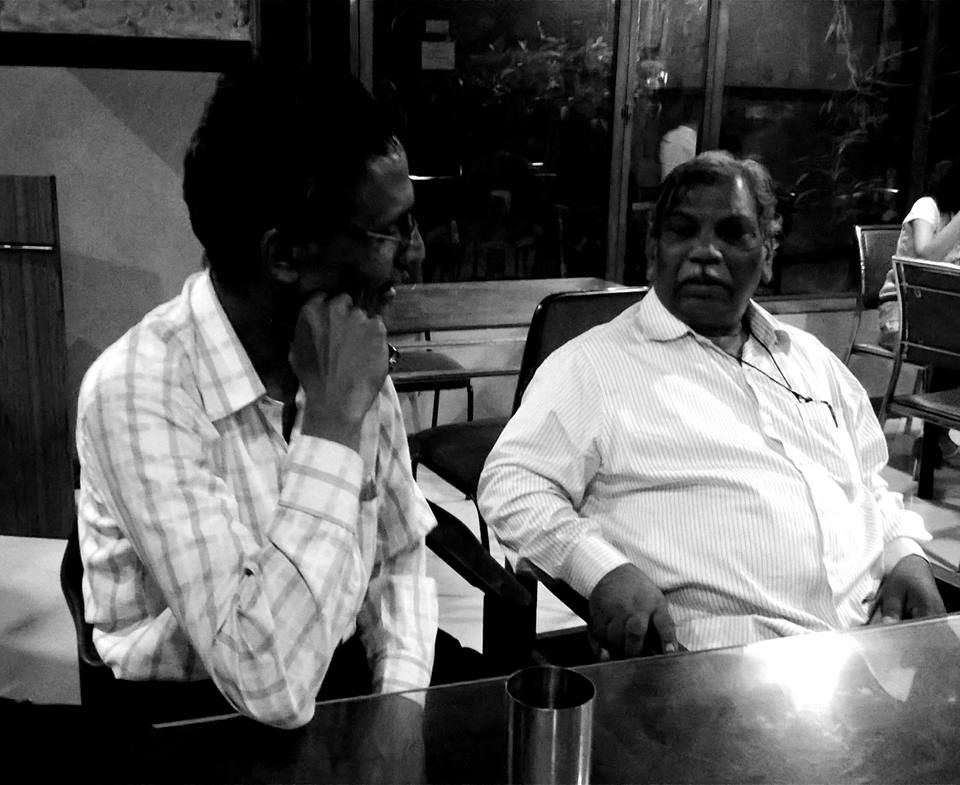Krantikari Janata: First Ambedkarite magazine published in Marathi and Urdu and its potential renaissance

By Yogesh Maitreya, TwoCircles.net
In an age where social media and websites have become the easiest way to reach audiences, how feasible is it to start a print bilingual magazine? But then, profit has hardly ever been a major concern for Jayawant Hire, a resident of Ramabai Nagar, Mumbai and an Ambedkarite who is determined to restart his project: a magazine called Krantikari Janata after a break of nearly 11 years.
[caption id="attachment_415920" align="aligncenter" width="960"] Jayawant (Left) with Eminent Ambedkarite Writer, J.V. Pawar (right) (Photo credit: Daisy Katta)[/caption]
Jayawant (Left) with Eminent Ambedkarite Writer, J.V. Pawar (right) (Photo credit: Daisy Katta)[/caption]
Twenty-six years ago, Hire launched Krantikari Janata to spread the movement of Ambedkar. Now in his mid-fifties, Jayawant Hire has witnessed and worked as, an important member of the Ambedkarite movement. When the magazine was launched, it was one of those remarkable magazines within Ambedkarite/Dalit literary tradition in Maharashtra that was established with the vision of strengthening the voice and literary resistance of Ambedkarite/Dalit masses. Krantikari Janata was perhaps the first magazine in Maharashtra that was simultaneously translated in Urdu from Marathi and published. The city of Bombay was witnessing many political and cultural upheavals in 1991. Ambedkarite Movement too was facing many shortcomings in its political domain, but on the other hand, new literary voices were emerging and enriching the quality of resistance against caste.
Despite a lack of resources and financial support, in 1991, Hire decided to start a magazine that was going to be bilingual. His decision seemed to be guided by a clear conviction and a vision. When asked the rationale behind the magazine, he said, “I started Krantikari Janata with the purpose of analyzing, explaining and propagating Ambedkarite Ideology since it was the need of an hour to go beyond the traditional frameworks, and to understand the thoughts of Babasaheb Ambedkar in the contemporary time and make it into a discourse; more importantly, spread them among masses and make them speak about it.”
Krantikari Janata was effective from 1991 to 2005, and while it published only six issues in Urdu, it is still a significant contribution in spreading the thoughts of Ambedkarite and anti-caste movement among Urdu speaking population, that too before the advent of social media.
Krantikari Janata managed to have between 2,750 and 3,000 subscribers. When asked why he decided to get it translated and published in Urdu as well, he said, “Ambedkar is for everyone. My objective was to take Ambedkarism among the Urdu-speaking population and to introduce them the lenses of Ambedkarism through which they could analyse and understand their social, political, economic, and educational situation in the caste-society in modern India. That time, Krantikari Janata was translated from Marathi to Urdu by Abdul Qayyum Sheikh who now is engaged in construction business.”
Urdu issues of Krantikari Janata were started in 1995 and though short-lived, they still stand for Hire’s vision to spread Ambedkar’s thoughts and communicate with people across languages. Jayawant's wife, Anita Hire was also helping with the Urdu issues since she studied Urdu while studying in a school in Himachal Pradesh in which she topped the Urdu examination for two years. In Krantikari Janata, narratives of inter-caste marriages, caste-issues, caste-questions, secularism, democracy, Ambedkar’s vision of the society, poems, short-stories, novels in its special issues etc. were used to be the content.
But the journey of Krantikari Janata wasn't easy for Jayawant. Apart from the financial crisis and other infrastructural problems, he had to face another set of problems for being firm on Ambedkarite ideology and transmitting it through his magazine. He recalls, in a satirical manner, “To be firm with an ideology and practice it has its own disadvantages.”
In October 1991, the Pakistan Cricket team was supposed to come to Mumbai to play a cricket match. People from Shiv Sena were preaching rhetorics about it and went on to dug the ground where the match was supposed to be held. In a response to this undemocratic act, 'Mahanagar', a Marathi daily from Mumbai, had published an editorial criticising Bal Thakre and Shiv Sena. Later on, Shiv Sena people went to the office of Mahanagar and vandalised it. Krantikari Janata too published an editorial under the title, 'Khicho Ab Kamaan Ko/ Ab Talwar Nikalo/ Jab Toap Mukabil Ho Toh/ Akhabar Jalado.' The title of Krantikari Janata was a satirical response to the punch line of Shiv Sena's literary magazine, Marmik, that said 'Khicho Na Kamaan Ko/Na Talwar Nikalo/Jab Toap Mukabil Ho Toh/Akhbar Nikhalo.' This enraged Shiv Sena people. “I got phone calls from ShivSena people, threatening me, abusing me. They also threatened me to abduct.” Jayawant recalled about that incidence.
However, this did not stop him to go ahead with his vision. He went on publishing Krantikari Janata till 2005, undoubtedly facing many such incidences. Almost all the published issues of Krantikari Janata, both in Marathi and Urdu were destroyed by the rains and the flood that hit Mumbai in 2005. Jayawant did not even have enough resources to restore them. In 2005, it was only a financial crisis which stopped the launch of Krantikari Janata. But despite all these ups and downs, Jayawant is still determined to restart it. “This time I would like to publish it in both Marathi and English. I am working on it.” Jaywant says in his determined voice.
